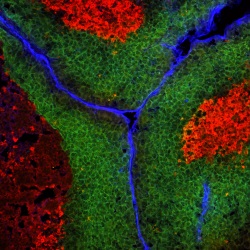Projects

We are interested in understanding the molecular and cellular mechanisms that regulate leukocyte recruitment into neoplastic tissue, and the subsequent regulation those leukocytes exert on evolving cancer cells. To address these issues, we have taken several approaches to investigate mechanisms involved in: i. induction and maintenance of chronic inflammatory microenvironments in premalignant, malignant and metastatic tissues using murine models of human cancer development, and clinical samples obtained fresh from the operating room from patients with cancer, ii. role of leukocytes in regulating tissue remodeling, angiogenesis, immune suppression and cancer development, iii. development of novel non-invasive imaging reagents to monitor immune response in tissues/tumors. The long-term goal of this work is to translate basic observations made in the mouse, toward rational design of novel therapeutics whose aim will be to block and/or alter rate-limiting events critical for solid tumor growth, maintenance or recurrence in humans, and/or therapeutics that enhance the efficacy of standard-of-care cytotoxic therapy.
Currently, we are actively utilizing transgenic mouse models of solid tumor development (non-small cell lung cancer, non-melanoma squamous, pancreatic and breast adenocarcinoma, and mesothelioma) to reveal the functional roles of adaptive and innate leukocytes during tumor development. These experimental studies are conducted in parallel with evaluation of representative human cancer specimens to affirm that mechanisms revealed in the experimental setting represent fundamental parameters of multi-stage cancer development in humans.